MercoPress. South Atlantic News Agency
Tag: fuel prices
-
Tuesday, May 28th 2024 - 14:01 UTC
Petrobras' new CEO upholds current pricing policy
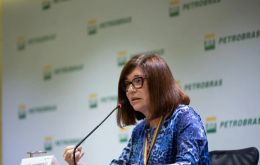
The new CEO of Brazil's State-run oil company Petrobras Monday defended during a press conference the company's current pricing policies to preserve domestic market stability, Agência Brasil reported. Magda Chambriard had been on her post three days after a reshuffle ordered by President Luiz Inácio Lula da Silva.
-
Thursday, September 15th 2022 - 10:15 UTC
Fuel prices help tame, slightly, UK August inflation but food prices keep soaring
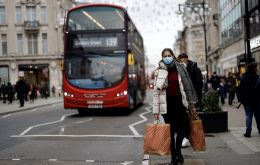
The United Kingdom consumer price index rose 9.9% annually in August, compared to 10,1% in July, according to estimates published on Wednesday by the Office for National Statistics, below a consensus forecast of 10.2%, but food prices continued to rise at its fastest pace since 2008.
-
Wednesday, September 14th 2022 - 19:52 UTC
Slight cut in price of Paraguayan fuel labeled insufficient
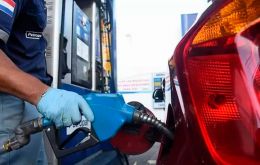
Paraguay's state-run oil company Petropar has announced a reduction of PYG 250 (US$ 0.036) for liquefied petroleum gas (LPG), marketed under the brand Ñande, and of PYG 150 (US$ 0.022) for 88-octane gasoline known as Kape, effective this coming Friday.
-
Tuesday, August 30th 2022 - 10:16 UTC
All fuel prices in Brazil down, thanks to Petrobras and tax reductions
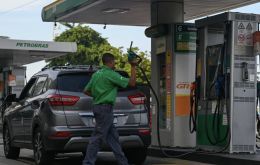
A survey from Brazil's National Oil, Gas and Bio-fuels Agency, ANP, showed that the average price for a liter of gasoline in service stations across Brazil had dropped 2,77%, and this way the price is now R$ 5,25 this week, the lowest it has been since February 2021.
-
Wednesday, June 22nd 2022 - 09:28 UTC
Bolsonarists looking for strategies to halt fuel price increases
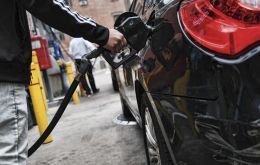
While Brazil's Energy Minister Adolfo Sachsida appeared Tuesday before the Lower House to answer questions about the current situation regarding the state-owned oil company Petrobras, the Government of President Jair Bolsonaro is concocting other strategies to curb the neverending increases in the price of fuel.
-
Tuesday, June 7th 2022 - 21:06 UTC
Argentina: 19 provinces hit by shortage of diesel fuel
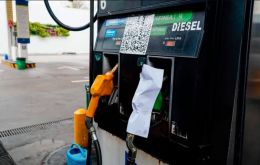
The shortage of diesel fuel, which at first affected only 8 provinces, has spread to the extent that Patagonia is the only region not yet going through a crisis, it was reported.
-
Thursday, June 2nd 2022 - 09:17 UTC
Argentina to up imports to meet increasing fuel demand
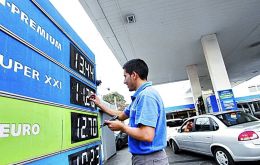
Argentina's Federal Government Wednesday announced new measures to guarantee the proper supply of diesel fuel nationwide after governors of the country's 10 Grand North provinces complained last Friday of recurrent shortages.
-
Thursday, March 31st 2022 - 10:25 UTC
Uruguayan gov't announces new increase in price of fuel
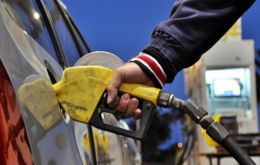
Uruguayan authorities Wednesday announced the price of fuel at pumps will go up as of Friday, April 1. President Luis Lacalle Pou confirmed that gasoline will go up UR$ 3 (US$ 0.07), from UR$ 74.88 (US$ 1.81) to UR$ 77.88 (US$ 1.88) and UR$ 5 (US$ 0.12) for diesel, from UR$ 53.99 (US$ 1.3) to UR$ 58.99 (US$ 1.49).
-
Saturday, February 12th 2022 - 09:24 UTC
Fuel goes up in Paraguay, but tanking up in Argentina not an option

The state-run oil company Petróleos Paraguayos (Petropar) has announced an increase in the price of fuel at pumps effective Saturday, Feb. 12, despite previous announcements that there would be no changes until the end of the month.
-
Tuesday, August 31st 2021 - 09:50 UTC
Price of fuel goes down in Uruguay as of September
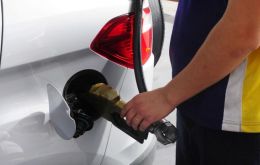
The Government of Uruguay Monday announced a small reduction in the price of fuel at pumps due to the use -for the first time- of the new Import Parity Price (PPI) adjustment formula devised by the current administration.
